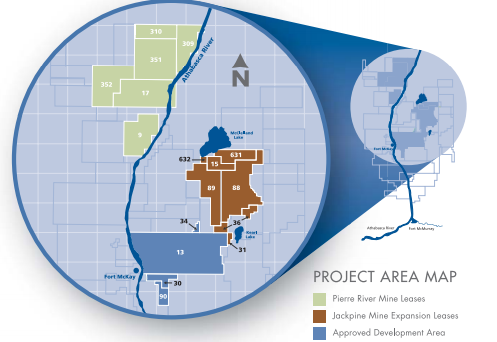Yesterday the Athabasca Chipewyan First Nation (ACFN) announced their plans to constitutionally challenge Shell Oil Canada’s expansion of the Jackpine Mine tar sands project. The project expansion would threaten the resources needed to sustain rights protected under Treaty 8, which the ACFN signed in 1899 at Fort Chipewyan on Lake Athabasca. A joint federal-provincial review panel will hear the challenge – the first of its kind to appear before such a group – on October 23rd, 6 days before the Jackpine Mine expansion application will make its own appearance before the panel on October 29.
In addition, greenhouse gas emissions from the project would total 2.36 megatons of
CO2 equivalent each year – an increase of 5.2 per cent in tar sands emissions from 2009, or roughly 281,000 cars on the road. Since Shell proposed the expansion in 2007,
11 additional projects have been proposed in the tar sands region.
Such rapid industrialization of the landscape threatens indigenous ways of life, such as those protected under historic agreements like Treaty 8.
“We have repeatedly tried to engage with both the government and Shell to find a better way to address our rights,”
ACFN Chief Allen Adam said in the
release. “However, the government has not listened to us or made meaningful attempts to accommodate the
ACFN in relation to the impacts of this and other tar sands projects. They have failed to accurately inform themselves of what our people truly require in order to protect our lands and rights.”
Portrait of Chief Allan Adam by Kris Krug. DeSmog travel to Fort Chipewyan to meet with the Chief in early 2012 to investigate the tar sands impacts on local communities and wildlife. Check out our documentary feature Cry Wolf: An Unethical Oil Story about caribou declines in the region and the industry and government’s plan to eradicate wild wolf populations as a (false) remedy.
The ACFN challenge could be precedent setting if the regulatory approval process takes constitutionally protected treaty rights into consideration when evaluating projects like the Jackpine Mine expansion.
The proposed expansion would increase production from 200,000 barrels per day (bbl/d) to 300,000 bbl/d.
According to
Alberta Environment public disclosure documents, the Jackpine Mine expansion entails new open pit mines, processing facilities, and transportation infrastructure. The application also includes increased water withdrawals and areas for toxic tailings ponds.
In an August 12, 2012 letter sent to Shell,
Environment Canada wrote that “several matters will require further discussion to fully understand potential project effects and ensure suitable mitigation can be implemented.”
Additional federal departments have voiced their concerns over the rapid expansion of the tar sands industry and the capacity operators have to assess their cumulative environmental impacts.
Environment Canada suggests that Shell has failed to consider
the impact of expansion on caribou habitat, for example, claiming the company has minimized potential negative effects the project might have on the species that is currently labeled ‘threatened’ under the federal Species at Risk Act.
According to the CBC, Shell claims that “the amount of high-quality caribou habitat destroyed is of ‘low magnitude,’ even though the company acknowledges the loss amounts to about 40 per cent of the animal’s habitat.”
“It is unclear how Shell Canada defines a 40 per cent loss…as a low-magnitude effect,”
said Environment Canada.
Beyond habitat and wildlife concerns, Environment Canada has expressed uncertainty regarding Shell’s approach to toxic tar sands tailings. The company plans to store tailings “for decades in artificial lakes capped with clean water,”
according to the CBC.
Environment Canada responded by saying the ministry “remains concerned with Shell Canada’s ability to predict and control effluent quality from the end pit lakes.”
The federal body is worried Shell is not taking the probable changes associated with climate change seriously enough, saying the company’s predictions regarding precipitation underestimate potential rainfall by as much as one-half to two-thirds; an estimation, that if proven wrong, could have disastrous consequences for contamination in local rivers.
Fisheries and Oceans Canada expressed similar concerns regarding Shell’s capacity to manage unforeseen negative effects: “Uncertainty remains as to how the proposed no-net-loss plans will compensate for indirect and cumulative impacts to the fisheries resource and whether surrounding habitats will be as productive as before.”
Local First Nations who rely on the land for their survival and to exercise their traditional fishing, hunting and trapping practices are on the frontlines of the battle to slow the expansion of the tar sands.
“Our community and our leadership at
ACFN are taking steps to slow down development in Northern Alberta in order to ensure our rights and lands are protected now and into the future,”
stated Eriel Deranger, communications coordinator for the
ACFN. “As Denesuline people, it is our responsibility to protect our lands, our rights and all that mother earth provides for our people. We hope people will support us as we put forward ground breaking challenges in Alberta.”









